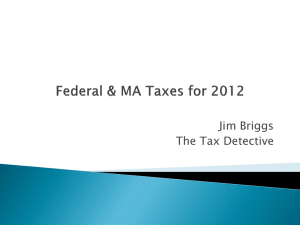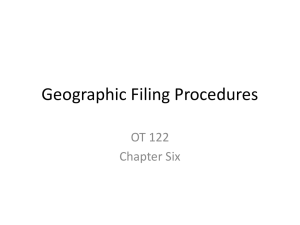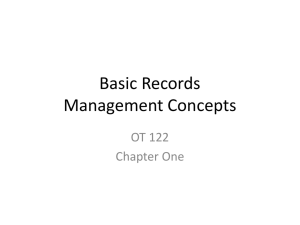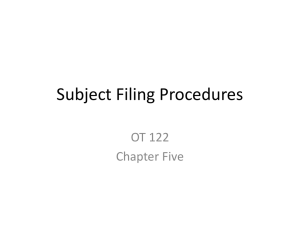A Central Filing System for Financing Statements
advertisement
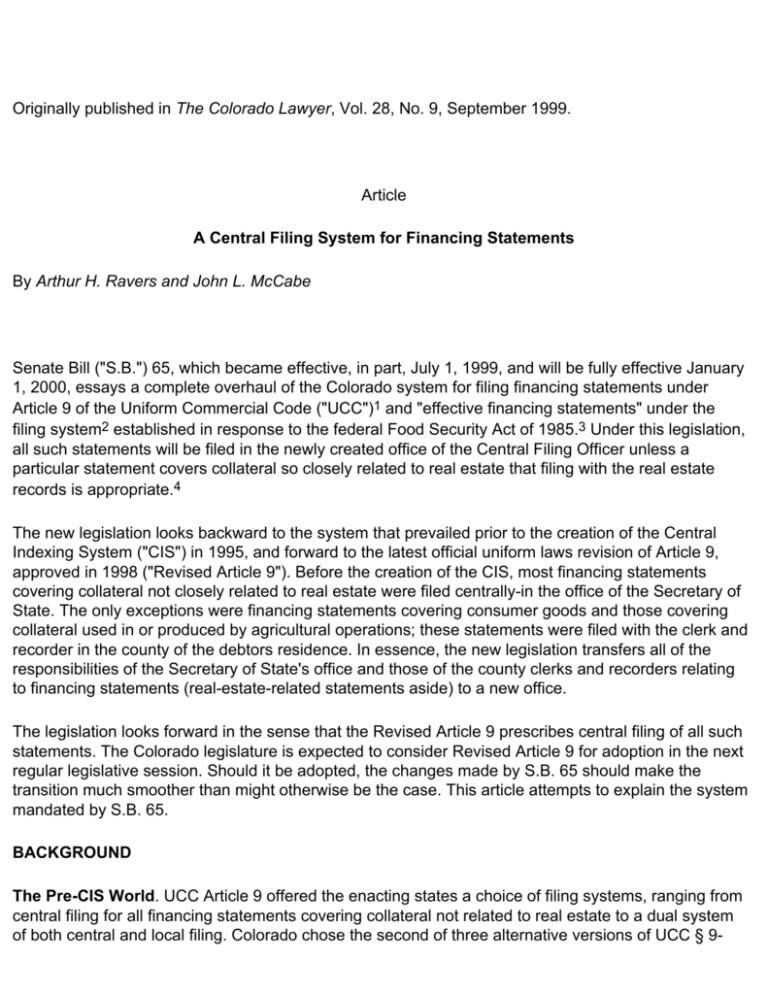
Originally published in The Colorado Lawyer, Vol. 28, No. 9, September 1999. Article A Central Filing System for Financing Statements By Arthur H. Ravers and John L. McCabe Senate Bill ("S.B.") 65, which became effective, in part, July 1, 1999, and will be fully effective January 1, 2000, essays a complete overhaul of the Colorado system for filing financing statements under Article 9 of the Uniform Commercial Code ("UCC")1 and "effective financing statements" under the filing system2 established in response to the federal Food Security Act of 1985.3 Under this legislation, all such statements will be filed in the newly created office of the Central Filing Officer unless a particular statement covers collateral so closely related to real estate that filing with the real estate records is appropriate.4 The new legislation looks backward to the system that prevailed prior to the creation of the Central Indexing System ("CIS") in 1995, and forward to the latest official uniform laws revision of Article 9, approved in 1998 ("Revised Article 9"). Before the creation of the CIS, most financing statements covering collateral not closely related to real estate were filed centrally-in the office of the Secretary of State. The only exceptions were financing statements covering consumer goods and those covering collateral used in or produced by agricultural operations; these statements were filed with the clerk and recorder in the county of the debtors residence. In essence, the new legislation transfers all of the responsibilities of the Secretary of State's office and those of the county clerks and recorders relating to financing statements (real-estate-related statements aside) to a new office. The legislation looks forward in the sense that the Revised Article 9 prescribes central filing of all such statements. The Colorado legislature is expected to consider Revised Article 9 for adoption in the next regular legislative session. Should it be adopted, the changes made by S.B. 65 should make the transition much smoother than might otherwise be the case. This article attempts to explain the system mandated by S.B. 65. BACKGROUND The Pre-CIS World. UCC Article 9 offered the enacting states a choice of filing systems, ranging from central filing for all financing statements covering collateral not related to real estate to a dual system of both central and local filing. Colorado chose the second of three alternative versions of UCC § 9- 401. Under that version, a secured party seeking to perfect a security interest in personal property was directed to file in one of three filing offices, the particular office depending on the nature of the collateral: 1. Financing statements covering security interests in personal property closely related to real estate -- fixtures, timber, and minerals -- were to be filed in the office where a mortgage on the real estate would be filed. 2. Financing statements covering property related to farming operations -- farm equipment, farm products, and the like -- and those covering consumer goods were to be filed in the office of the county clerk of the county in which the debtor resided. 3. All other financing statements -- such as those covering inventory, equipment, chattel paper, and certain accounts receivable -- were to be filed with the Secretary of State.5 A person contemplating making a secured loan to a debtor could, by a search of the records, ascertain whether the proposed collateral was already subject to a security interest. In many cases, this required a search of only one office. For example, if the person were interested in the debtor's accounts receivable, it would be necessary to look only in the records of the Secretary of State (assuming they did not arise out of farming operations or, under certain circumstances, the sale of minerals at the wellhead or minehead). The searcher would first check the index kept by the filing officer. If it did not show any financing statements filed with respect to that debtor, the person could proceed, being reasonably confident that it would have a security interest in the accounts that was prior to any other such UCC interest. There remained only the risk that a financing statement had been filed, but that somehow it had not gotten into the index properly. Under Article 9, a financing statement is deemed filed when it has been received by the filing officer and the proper fee tendered, or the filing officer has accepted it for filing.6 Such a statement could be effective against the searching party if, for example, the filing officer made a mistake in indexing it. If, on the other hand, the problem resulted from errors by the secured party in completing the financing statement, the statement would not be effective. If the index showed that financing statements had been filed with respect to that debtor, it would be necessary for the searcher to examine the financing statement itself (or a facsimile thereof) to determine whether the collateral covered was the property in which he or she was interested. The Central Indexing System. The legislation creating tile Central Indexing System changed all this, except for the rules relating to the proper place to file a financing statement covering collateral closely related to real estate. Hereafter, in this article, such real-estate-related financing statements are treated only to the extent that they affect the changes that were made by the CIS legislation and by S. B. 65. The vision of the drafters of the CIS legislation was a filing system that availed itself of recent developments in computer technology and that was convenient for filers and searchers. It permitted a financing statement to be filed in any of the sixty-four filing offices in the state (the Secretary of State and each county clerk and recorder), even in a location having no relationship to the parties or the secured transaction. Thus, a Denver bank making a loan to a business located in Colorado Springs on the security of equipment physically located at the debtor's place of business could file a financing statement in Ouray that would be effective to perfect that security interest. A subsequent party interested in any collateral had only to search in the CIS Central Index under the name of the debtor. The Central Index would direct the searcher to the office in which the financing statement had been filed and any desired examination of the financing statement could follow. Likewise an "effective financing statement" filed pursuant to Article 9.5 could be filed at the same time, in the same location, and the agricultural financer would receive protection against buyers in the ordinary course of business of farm products. The list of such statements also would be accessible through the Central Index. The CIS system was plagued with difficulties from the beginning. In order for this system to work, it was necessary to get information with respect to all outstanding financing statements into the database of the Central Index. To accomplish this, the legislation required that continuation statements relating to all pre-July 1, 1996, financing statements and "effective financing statements" be filed between July 1, 1996, and December 31,1997, regardless of the expiration date of the financing statement (a "Window Period Continuation Statement").7 This was necessary even if a routine continuation statement had been filed just before July 1, 1996. Failure to file such a Window Period Continuation Statement would result in the financing statement becoming ineffective on January 1, 1998.8 More importantly, the system imposed on each of the filing officers the obligation to transmit promptly to the Central Index accurate information with respect to every UCC filing received by that office other than real-estate-related filings. (Each filing office continued to maintain its own index in its own office.) If even one filing officer failed in this responsibility, the reliability of the system would be seriously compromised, because no searcher could rely on the absence of Central Index entries for assurance that it could obtain a security interest prior to any other. For example, suppose that our Colorado Springs debtor attempted to get a second secured loan using the equipment covered by the Denver bank's security interest as collateral. If the filing officer in Ouray were tardy in transmitting information, or the information transmitted were erroneous, a search of the Central Index under the debtor's name might well reveal nothing, even though the Denver bank had a perfected security interest in the equipment and even though the local index would reveal it. The searching party would not, as a practical matter, be able to protect itself by a search of the index in the Secretary of State's office or the local Colorado Springs office since the filing was in Ouray. Ouray is a location that would not be intuitively obvious to a searcher, and a search of all sixty-four filing offices would not be practical. Another difficulty related to the inability of any single filing officer or the CIS to give a useful certificate relating to the state of the records.9 The CIS could certify only what its records showed had been transmitted to it, and each filing officer could certify as to the state of only his or her own records. Yet another problem was created by the limitations of the software used by CIS in indexing the financing statements that limited the description of collateral to 250 characters per indexed item, a limit that was often too constraining. In summer 1998, a Report of the Legislative Audit Committee concluded that the Central Indexing System simply was not working. The Report concluded that: accurate information was not getting into the system; information received from the Secretary of State and many local filing offices was often riddled with errors; and there were unacceptable delays before filed financing statements were centrally indexed. The Report recommended that the system be jettisoned in favor of a central filing system. SENATE BILL 65 Basic Structure of the New Central Filing System. S.B. 65 is an attempt to implement the Audit Committee's recommendations.10 It sets up a central office for the filing of all non-real-estate-related financing statements.11 Several agency candidates were considered for the location of this central office: the Department of Personnel, the Secretary of State, and -- the one ultimately chosen -- the Central Indexing System Board (or, more precisely, the designee of such Board). Under the bill, the Central Indexing System is renamed the Central Information System to reflect that its responsibilities will no longer be limited to the maintenance of a central index for items filed elsewhere. The composition of the Board will change slightly as terms end and vacancies occur. The number of representatives of the county clerks and recorders will drop from two to one, and the Board will no longer have representatives of the automobile and insurance industries. In their stead, the Board will have representatives of the bar and the search companies, as well as a member-at-large with expertise in computer technology.12 While these changes do not amount to a major overhaul of the Board, they should bring to the Board the voices of groups vitally interested in the functioning of the system called for by the legislation. At the same time, the change in membership reflects the reduced responsibilities of the county clerks and recorders under the new system. Recognizing that the Board itself is not institutionally capable of administering an ongoing operation, the drafters required the Board to designate some person as "central filing officer."13 This person will have the day-to-day responsibility of running the central filing office. All personnel and property of the office of the Secretary of State that has previously been used to discharge the Secretary's responsibilities under the present system (and its predecessor) will be transferred to the new central filing office. This transfer is to be accomplished by January 1, 2000, the date on which the central filing office will become the place to file all financing statements, continuation statements, amendments, assignments, partial releases, and termination statements under Article 9, as well as the place to file all "effective financing statements" under Article 9.5. The law thus contemplates that by the time all such filings are to be made centrally (i.e., January 1, 2000), there will be in existence an office in which this may occur.14 Mechanics of Central Filing. Beginning January 1, 2000, any person seeking to perfect by filing a security interest in collateral not closely related to real estate will file a financing statement in the Central filing offiCe.15 The Central filing office will thereafter maintain the database of all UCC and agricultural filings, including images of all filings, and will create and maintain an index of items so filed. The legislation contemplates that the central filing office will be able to profit from the experience gained in implementing the Central Indexing System and that it will employ wherever possible up-todate technology to facilitate both filing and searching of the records. In particular, S.B. 65 directs the central filing officer to take steps to facilitate filing electronically and by facsimile.16 However, S.B. 65 provides that the traditional filing of a hard copy shall remain an option those choosing it. By reuniting the tasks of receiving filings and maintaining the index of such items, the legislation restores "one-stop shopping" for those searching the record, at least with respect to all items filed after January 1, 2000.17 However, there are countless filings under the present system scattered throughout all sixty-four of Colorado's filing offices. The new law there fore requires the central filing officer to obtain originals or true copies of all previous filings that will be of interest to searchers after January 1, 2000. As described in S.B. 65, these are: 1) all UCC records (defined as all non real-estate-related financing statements and other items filed pursuant to Article 9) and all "effective financing statements" filed on or after July 1, 1996; 2) all UCC records and "effective financing statements" filed prior to July 1, 1996, that have been continued by the filing of a Window Period Continuation Statement (and that have not been terminated by the filing of a termination statement); and 3) all continuation statements, amendments, statements of assignment, statements of release, and termination statements relating to the UCC records or "effective financing statements" in the two preceding categories.18 In simple terms, the legislature directed that all earlier filings still of interest be physically accessible in the central filing office. If the legislation's goal is achieved, when the central filing officer has completed the task of obtaining all these records, "one-stop shopping" should be a reality. Until that has occurred, a trip to an office other than the central filing office may be required, as is the case today. The predictions about when the central filing office will have consolidated all files and be working smoothly vary widely-from "we're almost there now" to "never." S.B. 65 prescribes a six-month period (i.e., no later than July 1, 2000), so perhaps that is as good a prediction as any. When the database has been completed, the central filing officer will be in position to issue a certificate regarding the state of the files. As noted, one of the vices of the system that separated the Central Index from localized filing was that no single officer was in a position to issue such a certificate. All that CIS could certify was the state of the Central Index; all that a particular filing officer could certify was the state of his or her particular files. Under the legislation, this defect should be eliminated.19 Power to Reject Filings. Beginning July 1, 1999, the new law requires the central filing officer (and authorizes any county clerk and recorder as to real-estate-related filings) to reject submissions on a number of grounds. Any financing statement or other item so rejected is not "filed" for purposes of Article 9, which means, in the case of an initial financing statement, that the security interest is unperfected and, in other cases, that the intended amendment, assignment, continuation, release, or termination has not been accomplished. The filing officer is required to inform the party attempting a filing of the grounds for rejection so that the defect may be corrected and the item resubmitted. However, perfection or other intended action, and any rights dependent thereon, would not result until the defect is corrected and the item is correctly resubmitted or accepted.20 Prior to the CIS legislation, filing officers routinely rejected filings that on their face were defective. This screening process was prohibited by the CIS legislation, which required all filing officers to accept any legible filing for which the proper fee was tendered.21 The open filing mandate has resulted in a substantial number of confusing, inconsistent, and bogus filings that clutter CIS search reports and will inevitably give rise to disputes between competing secured parties. The application of the rejection rules put in place by S.B. 65 should eliminate or greatly reduce on a going-forward basis the havoc created by the several years of "open filing" that the public has so far endured. The grounds for rejection are as follows: 1. The record is not presented by a method or medium of communication authorized by the filing officer. 2. The appropriate filing fee is not tendered. 3. The record cannot be indexed because of any one or more of the following defects: a) the record does not adequately identify the debtor or debtors (names, mailing addresses, and social security or taxpayer identification numbers are required); b) an amendment, assignment, continuation statement, release, or termination statement does not adequately reference the financing statement to which the record is applicable (file number, filing office, and at least one debtors name are required); c) an amendment, assignment, continuation statement, release, or termination statement refers to a financing statement that is ineffective because it has lapsed (including a financing statement that became ineffective for failure to file a Window period Continuation Statement); d) an initial financing statement or an amendment that adds a new secured party fails to provide the name and address of the secured party; e) an assignment fails to give the name of the assignee; and f) a continuation statement is not filed during the statutorily prescribed period. This list constitutes the only bases on which a filing officer may reject a filing. It may be asked what happens if a filing officer rejects a filing on some ground other than those set out in the statute. Since Article 9 provides generally that a financing statement is filed when it is presented or otherwise accepted, and the new legislation states that filing does not occur with respect to an item rejected for one of the enumerated reasons.22 it may be thought that the statute contains the negative implication that such writings are nevertheless "filed" if rejected for some other reason. However, these authors believe that such an interpretation would be inconsistent with the evident decision of the legislature to put the burden of any rejection on the party who knows of it and can take steps to prevent any loss resulting from that rejection, rather than on a searcher who would be powerless to protect itself. Since filing officers do not seem eager to reject filings casually, this problem may not arise frequently in practice. CIS Board Oversight of the Central Filing Officer. The legislation requires the Board to monitor the performance of the central filing officer by periodic internal audits. These audits are to assess the completeness and accuracy of the central filing officer's records, the time lag between the presentation of a filing and its appearance in such records and index, and the retrievability of such record, among other factors bearing on the central filing officer's performance. Such audits are to be conducted quarterly between November 1, 1999, and November 1, 2000, and the results reported to the Legislative Audit Committee. The Board also is required to do an annual comparative analysis of systems employed in a random selection of other states.23 Fees and Funds. Much of the fee structure for the central filing office is prescribed by statute. CRS § 4-11-102 sets fees for the filing of financing statements, "effective financing statements," continuation statements, assignments, releases, and termination statements. It also sets fees for the issuance of a certificate or for the provision of copies. These fees are subject to the proviso that they shall be adjusted downward should the established fees produce reserves, with the Board being empowered to increase them again should costs increase. In effect, the statutory fees serve as ceilings on the fees that may be charged for the enumerated activities. The Board is empowered to establish fees for other services to be rendered, including accessing the information in the Central Information System, distributing the master list (or portions thereof) of "effective financing statements" to buyers of farm products, commission merchants, and the like, and the filing of notices of agricultural hens. The funds generated by these fees are to be transmitted to the State Treasurer and credited to a Central Information System fund, to be subject to annual appropriation by the legislature for the operation of the Central Information System, including the central filing office.24 The current one-dollar surcharge on filings expired on July 1, 1999. The county clerks' technology fund previously created within what was then called the "Central Indexing System fund" will be closed out on December 31, 1999, with all equipment, software, and other property previously purchased with moneys from the fund becoming the property of the respective counties in which the property is located, and any unexpended moneys being allocated among the county clerks in accordance with a formula approved by the Board.25 Contracting with Private Parties. The Board is empowered to contract with private parties to provide goods and services necessary for the operation of the central filing office, and reliance on private providers where possible is encouraged.26 The legislation carries forward immunity from personal liability for all contractors resulting from errors or omissions in receiving, entering, storing, or providing information or in performing other dulties.27 Miscellaneous Liens And Notices of Liens. Although the main objective in creating the central filing office was to provide a central location for filings under Article 9 and "effective financing statements" under Article 9.5, the legislature also took the occasion to transfer to the central filing office from the former CIS and the office of the Secretary of State responsibility for handling a number of other hens and notices. These include (1) notices of liens on personal property (other than wages and moneys held by a financial institution) filed by the state child support enforcement agency; (2) notices of federal hens on personal property against corporations, partnerships, LLCs, trusts, and estates; and (3) notices of hospital hens.28 CONCLUSION. If S.B. 65 achieves the objectives of the Colorado legislature, many of the problems of the present system will be rectified. Even if it falls short in some respects, it should produce a great improvement over what is currently in place. However, it is not the last time that Colorado's personal property security law will undergo examination. When Revised Article 9 is presented for consideration to the Colorado General Assembly -- something that could occur as early as the 2000 session many changes made in Article 9 will have to be carefully evaluated. Meanwhile, the central filing system created by S. B. 65 will have anticipated at least one of the big changes proposed by such revision. Notes 1. CRS ' 4-9-401 et seq. 2. CRS ' 4-9.5-101 et seq. 3. P.L. 99-198; 7 U.S.C. ' 1631. 4. Such real-estate-related collateral consists of fixtures, timber to be cut, minerals, or other substances that may be extracted from the earth and accounts subject to CRS ' 4-9-103(5). 5. The system was complicated by Congress's passage of the Food Security Act of 1985, supra, note 3. Under Article 9, a buyer in the ordinary course of business takes free from any (perfected or unperfected) security interest created by its seller, unless the collateral is farm products (CRS ' 4-9307) [of course, any buyer for value without knowledge of an unperfected security interest takes free from that interest: CRS ' 4-9-301(l)(c)]. This exception generated a substantial body of litigation between secured financers of farming operations and buyers of farm products in which the buyers attempted to prove that the financers in one way or another had "authorized" the sale of the farm products free from the security interests or that the financers were "estopped" to object to the sale. Viewing this ongoing conflict as undesirable, Congress intervened. The Food Security Act first reverses the rule of Article 9 as to farm products and allows the buyer in the ordinary course of business of farm products to take free from the seller's security interests, but then offers a way for the secured party to preserve its position against the buyer. States were given a choice between two systems, one of which is the establishment of a central filing office where a secured party may file "an effective financing statement," relating to each of its debtors. Under this alternative, the office compiles a list of parties who have filed such statements with respect to particular debtors and distributes this list to all buyers who have registered with it. Any buyer receiving the list (or failing to register with the appropriate office) is subject to the rights of any secured party so listed. Colorado established such a system in Article 9.5, Since local filing was required to perfect a security interest in farm products, the effect was to require two filings in two different offices for any secured party who wished protection against adverse claims to collateral consisting of farm products. 6. CRS ' 4-9-403(l). 7. CRS ' ' 4-9-412 and 4-9.5-106. 8. The Secretary of State, the CIS Board, and their respective staffs were energetic in their efforts to notify interested persons of this requirement. Nevertheless, over 200,000 financing statements did become ineffective on that date. How many of these related to concluded transactions is impossible to know. 9. CRS ' 4-9-407(2). 10. In this article, citation is to sections of S.B. 65, indicating as to each which provision of the Colorado Revised Statutes it amends. E.g., "' 10, amending CRS ' 4-9.3-104." 11. ' 1, amending CRS ' 4-9-401(l)(b)(I)(C). 12. ' 9, amending CRS ' 4-9.3-103. 13. ' 8, amending CRS ' 4-9.3-102; ' 9, amending CRS ' 4-9.3-103(3)(j). 14. ' 2, amending CRS ' 4-9-401.5. 15. ' 1, amending CRS ' 4-9-401; ' 15, amending CRS ' 4-9.5-104. 16. ' 3, adding paragraphs (b)-(f) to CRS ' 4-9-403(l). 17. ' 6, adding new CRS ' 4-9-414. 18. New CRS ' 4-9-414(3). 19. CRS ' 4-9-407(2) obligates the filing officer to provide, upon request, the certificate. While S.B. 65 make some changes in the language of that section, it does not redefine the basic obligation. 20. ' 4, adding CRS ' 4-9-403.5. 21. CRS ' 4-9.3-106(l.5). In theory, under the law as it existed prior to S.B. 65, a filing officer could reject a document that could not be indexed under the debtor's name. However, since filings could be made in any one of sixty-four offices and the only master index, the Central Index, was maintained in yet another office, there was no practical way for the filing officer to determine whether a document could or could not be so indexed. As a consequence, filing Officers were reluctant to reject a filing on this basis. 22. CRS ' 4-9-403(l); new CRS ' 4-9-403.5(2). 23. ' 6, adding new CRS ' 4-9-415. 24. ' 11, amending CRS ' 4-9.3-105. 25. New CRS ' 4-9.3-105(4). 26. CRS ' 4-9.3-103(3)(c),(f). 27. CRS ' 4-9.3-107, as amended by S.B. 65, ' 13. 28. ' 21, amending CRS ' 14-10-122; ' 23, amending CRS ' 38-25-104; ' 27, amending CRS ' 36-27102. Arthur H. Ravers, Boulder, is a Professor of Law at the University of Colorado School of Law, (303) 492-8436; John L McCabe, Denver, is a partner in the firm of Davis, Graham & Stubbs LLP, (303) 892-7351.

